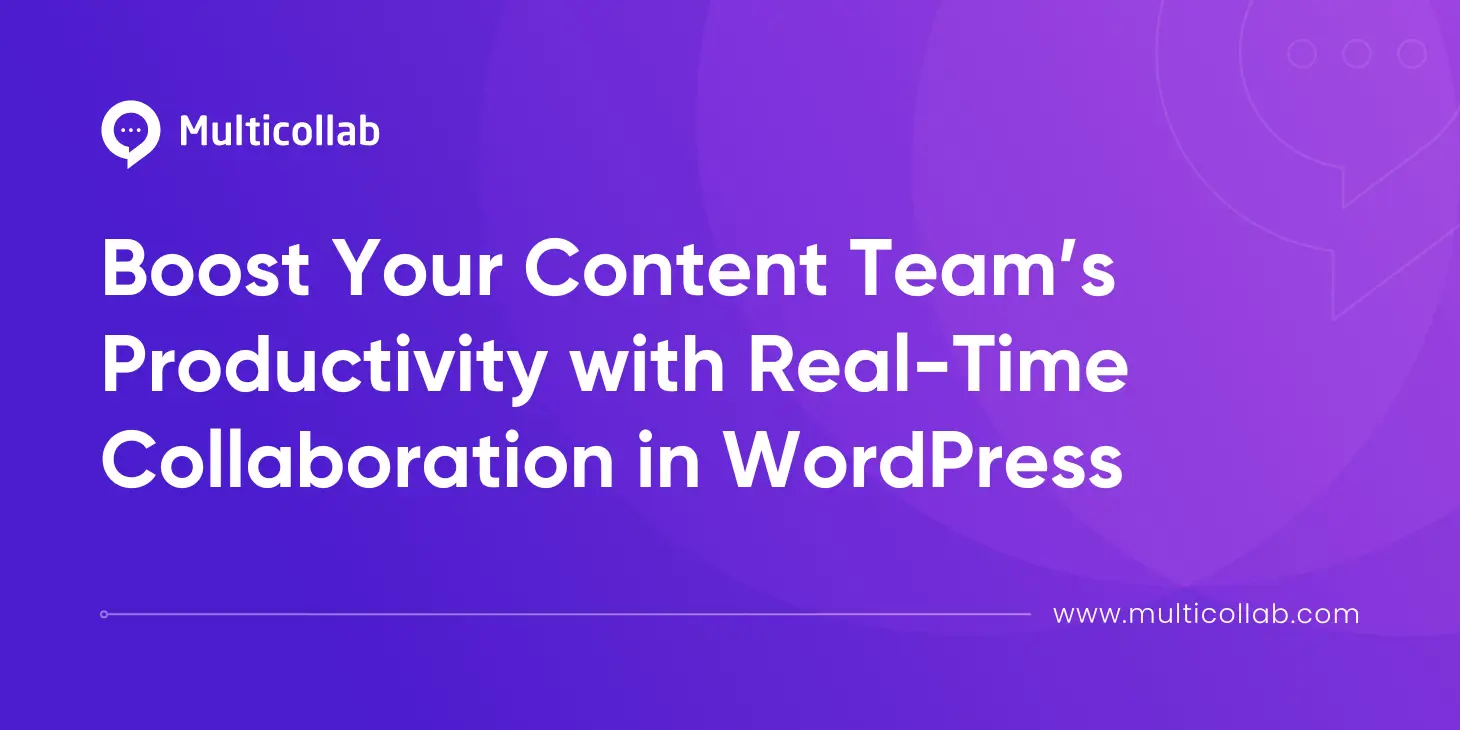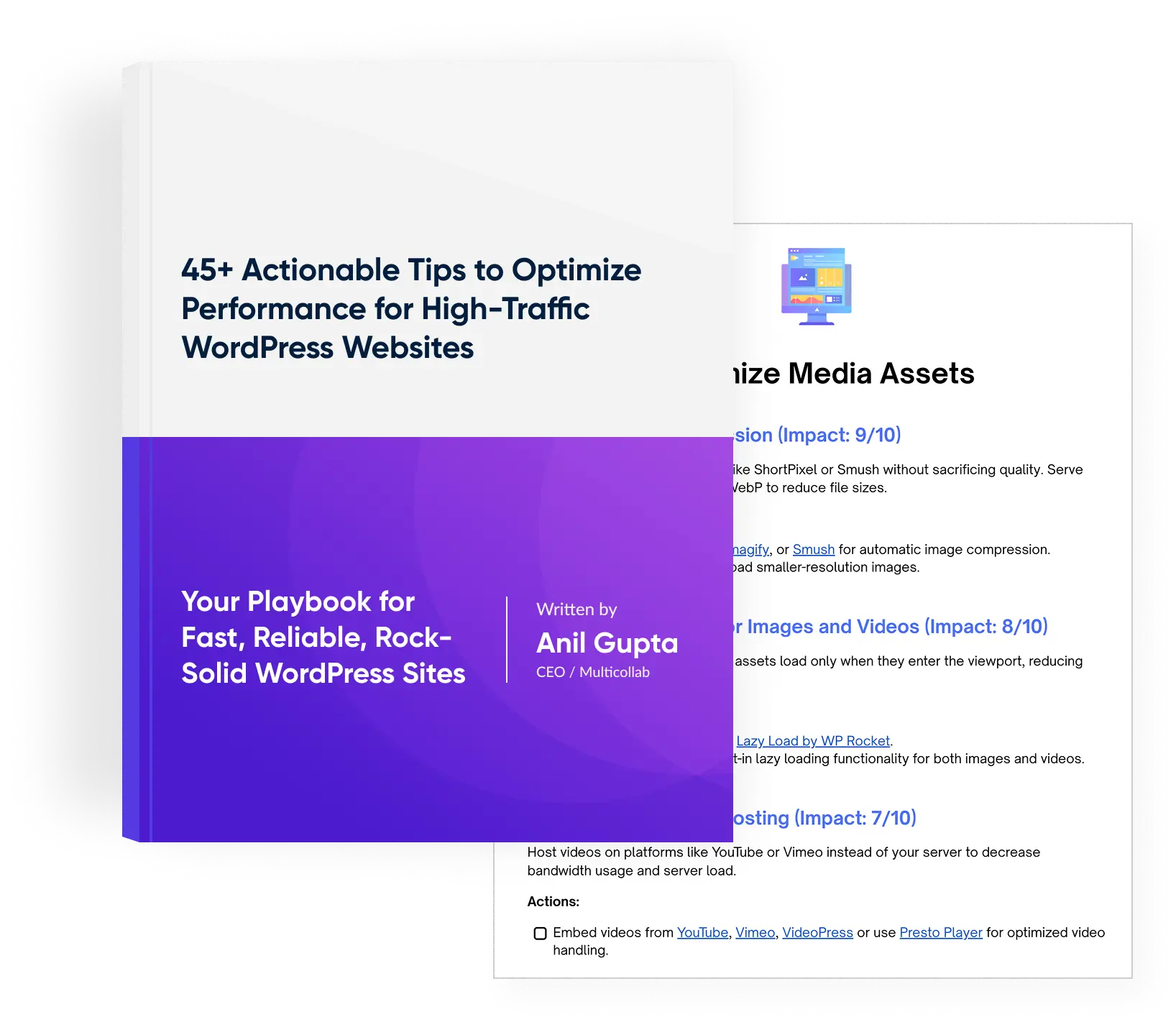Table of Contents
For digital content creation teams, productivity and efficiency are crucial. One of the most effective ways to enhance these aspects is through real-time collaboration.
Leveraging tools like Multicollab within WordPress can transform your content creation process, making it more streamlined, integrated, and efficient. In this post, we’ll delve into how real-time collaboration in WordPress can significantly boost your content team’s productivity.
Understanding the Need for Real-Time Collaboration in WordPress
Traditional content collaboration methods often involve a tedious back-and-forth process, with multiple versions of documents being shared via email or other platforms. This approach can lead to confusion, errors, and a significant waste of time.
Real-time collaboration addresses these issues by allowing multiple users to work on the same content simultaneously, ensuring everyone is on the same page and can see updates in real-time.
Benefits of Real-Time Collaboration
Increased Efficiency:
- Team members can make changes and see them reflected immediately, reducing the lag time between revisions and approvals.
- Multiple users can edit a document at the same time, which speeds up the content creation process and helps meet tight deadlines.
Improved Accuracy:
- Real-time collaboration minimizes the risk of errors that can occur from merging different versions of a document.
- Inline comments and suggestions ensure that feedback is given and addressed promptly, maintaining the quality and accuracy of the content.
Enhanced Communication:
- Team members can discuss changes in real-time, fostering better communication and understanding.
- All collaboration happens within the WordPress environment, eliminating the need for multiple communication tools and platforms.
Better Workflow Management:
- The entire content creation process, from drafting to final approval, happens in one place, making it easier to manage and track.
- Assign specific roles and permissions to team members, ensuring that everyone knows their responsibilities and can collaborate effectively.
How Multicollab Facilitates Real-Time Collaboration in WordPress
Multicollab is an editorial plugin designed to bring real-time collaboration features to WordPress, similar to what you might find in Google Docs. Here’s how it can transform your content creation process:
Real-Time Editing: Multiple users can edit the same post or page at the same time, with changes appearing instantly for all collaborators. This makes it easy for the team to see who is editing which part of the content in real-time, preventing overlapping edits and ensuring a smooth collaborative experience.
Inline Comments and Suggestions: Users can add comments to specific parts of the text or media, making it clear what changes are suggested and why. They can use ‘reply’ and ‘resolve’ options to discuss and finalize changes, all within the WordPress dashboard.
Track Changes with Suggestion Mode: Suggestion mode allows team members to propose edits that others can accept or reject, facilitating a smooth review process. Content teams can keep track of all changes made to the document, ensuring that nothing gets lost or overlooked.
Integrations with Communication Tools: Team members receive email alerts for comments, mentions, and replies, keeping everyone informed and engaged. For teams using Slack, Multicollab can send notifications directly to your Slack channels, ensuring real-time updates are never missed.
Guest Collaboration: Teams can invite clients, editors, or other stakeholders to collaborate without needing to create WordPress accounts, facilitating external input and review.
In-Depth WordPress Editorial Workflow with Multicollab
A content team at a tech startup can integrate Multicollab into their WordPress content workflow, using real-time editing to draft and refine blog posts while simultaneously editing the same document. To illustrate how an efficient editorial workflow is crucial for producing high-quality content quickly and effectively, we’ll explore a detailed WordPress editorial workflow using Multicollab.
In this in-depth demonstration, we’ll walk through each step of the process, showcasing how Multicollab’s features can enhance productivity and streamline content creation.
Step 1: Initial Content Planning
- The team gathers for a brainstorming session using a project management tool like Slack to outline content ideas and assign roles (writers, editors, SEO specialists, designers).
- The content manager assigns a content write to create a new draft post in WordPress, setting up the basic structure and key points to be covered.
Step 2: Drafting the Content
Real-Time Collaboration Setup:
- The content manager invites the assigned writers to collaborate on the new draft using Multicollab.
- Writers receive notifications and start working on the document simultaneously.
Simultaneous Editing:
- Each writer takes on different sections of the post. For instance, Writer A handles the introduction and conclusion, while Writer B focuses on the main body.
- As changes are made, all collaborators see updates in real-time, ensuring coherence and consistency.
Inline Comments:
- Writers add inline comments for sections needing input from others. For example, “Need more data here, can you add stats?”
- These comments guide the collaborative writing process, ensuring all necessary elements are covered.
Step 3: Content Review and Feedback
Editor Review:
The editor accesses the draft post and uses Multicollab’s inline commenting feature to leave detailed feedback. Comments might include suggestions for better wording, additional research, or structural changes.
Suggestion Mode:
- The editor makes suggestions directly in the text, highlighting changes. These suggestions can be accepted or rejected by the original writers.
- Example: The editor suggests replacing a paragraph with a more concise version. The writer reviews and accepts the change.
Team Collaboration:
The SEO specialist and designer are invited to review the draft. Using the ‘mention’ feature, the editor tags them in relevant comments, such as “@SEO_Specialist can you check the keyword density here?” or “@Designer please add an infographic in this section.”
Step 4: Refining and Finalizing
Addressing Feedback:
- Writers go through the editor’s comments and suggestions, making necessary changes. Inline comments are resolved once addressed.
- The SEO specialist optimizes the content based on the latest SEO practices, and the designer adds visual elements directly within the draft.
Guest Collaboration:
If client feedback is needed, a guest collaborator (client) is invited to view the draft and add comments without needing a WordPress account. Example: The client adds a comment suggesting a different approach to a section. The team discusses and incorporates the change.
Final Review:
- The content manager performs a final review, ensuring all comments are resolved and the content meets the quality standards.
- Using Multicollab’s reporting feature, the manager reviews the activity timeline to ensure all feedback is addressed.
Step 5: Publication and Distribution
The content manager schedules the post for publication, ensuring it aligns with the overall content calendar. Team members receive Slack or email notifications about the scheduled publication, ensuring everyone is aware of the content’s status.
After publication, the content is monitored for performance. Any post-publication changes are made collaboratively using the same workflow.
Overcoming Current Limitations: While Multicollab is a powerful tool, it does have some limitations, such as supporting only five concurrent users and not working with suggestion mode in some cases.
Here are some strategies to optimize its use despite these limitations:
Prioritize Key Collaborators: Ensure that the most critical team members are the ones using the real-time collaboration features during high-priority projects.
Staggered Collaboration: If more than five users need to collaborate, stagger their participation to avoid exceeding the limit.
Regular Updates: Keep an eye on updates from Multicollab, as the developers are likely to expand capabilities and address current limitations over time.
Best Practices for Maximizing Real-Time Collaboration Benefits
Train Your Team: Ensure that all team members are familiar with how to use Multicollab’s features. Provide training sessions and resources to help them get up to speed.
Set Clear Roles and Permissions: Define who can make edits, add comments, and approve suggestions. Clear roles help prevent confusion and ensure that everyone knows their responsibilities.
Regular Check-Ins: Schedule regular meetings or check-ins to discuss ongoing projects and address any issues or questions related to the collaborative process.
Utilize Integrations: Make the most of email and Slack notifications to keep everyone informed about updates and changes in real-time.
Encourage Open Communication: Foster a culture of open communication where team members feel comfortable sharing their ideas and feedback. This will enhance collaboration and lead to better content.
Conclusion
Real-time collaboration is a game-changer for WordPress content teams, offering a host of benefits that can significantly boost productivity and efficiency.
By leveraging tools like Multicollab, teams can streamline their workflows, improve communication, and produce high-quality content faster. So, why wait. Try Multicollab’s real-time collaboration today and watch your content team thrive.








